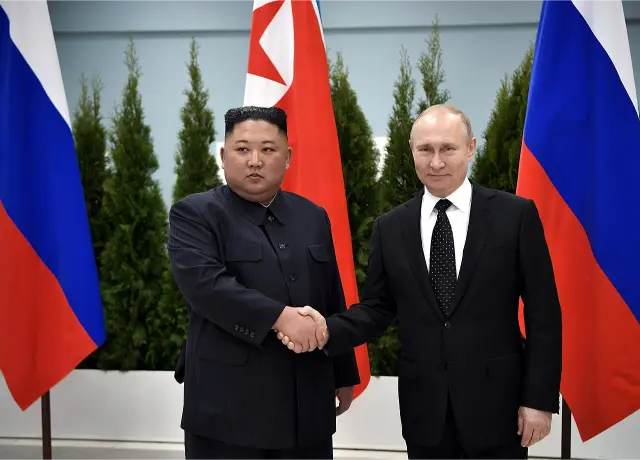Russian President Vladimir Putin said Russia and North Korea have ramped up ties to a “new level,” pledging to help each other if either nation is attacked in a “breakthrough” new partnership announced during the Russian president’s rare visit this week to the reclusive state.
Thousands of North Koreans chanting “welcome Putin” lined the city’s wide boulevards brandishing Russian and North Korean flags and bouquets of flowers, as Putin kicked off his first visit to North Korea in 24 years.
The pair then signed a defense pact, a new strategic partnership to replace previous deals signed in 1961, 2000 and 2001.
“The comprehensive partnership agreement signed today includes, among other things, the provision of mutual assistance in the event of aggression against one of the parties to this agreement,” Putin said after the meeting.
He said the deal encompasses the “political, trade, investment, cultural spheres, and the security sphere as well,” calling the pact “truly a breakthrough document.”
Putin said joint drills involving the United States, South Korea and Japan were “hostile” towards North Korea,” characterizing the US policy as “confrontational.” Kim, meanwhile, called the new “alliance” a “watershed moment in the development of the bilateral relations.”
Both Kim and Putin described their deal as a major upgrade of bilateral relations, covering security, trade, investment, cultural and humanitarian ties. Outside observers said it could mark the strongest connection between Moscow and Pyongyang since the end of the Cold War.
North Korea has been under strict United Nations Security Council sanctions for years over its nuclear weapons and missile programs. Russia is also grappling with sanctions by the US and its allies over the invasion of Ukraine.
Along with China, North Korea’s main ally, Russia has repeatedly blocked US-led efforts to impose new UN sanctions over North Korea’s weapons tests and satellite launches, as noted by Al-Jazeera.
An alliance between Russia and North Korea poses several potential threats on multiple fronts, including geopolitical stability, military dynamics, and economic sanctions.
Military collaboration
North Korea will supply Russia with ammunition, artillery shells, and other military hardware, bolstering Russia’s capacity in conflicts such as the war in Ukraine. In return, Russia will provide North Korea with advanced military technology, including missile and nuclear technology, enhancing North Korea’s threat to regional stability in East Asia.
Nuclear proliferation
Collaboration would likely lead to advancements in North Korea’s nuclear weapons program, increasing the threat to South Korea, Japan, and potentially the United States. Such an alliance will undoubtedly undermine international efforts to curb nuclear proliferation, leading to a more unstable and dangerous global security environment.
Regional destabilization
This alliance will exacerbate tensions in Northeast Asia, particularly with South Korea and Japan, leading to a regional arms race and increased risk of military conflicts. It will also embolden other authoritarian regimes, weakening democratic institutions and international norms.
Economic impact
Both countries are likely to cooperate to evade international sanctions, undermining the effectiveness of economic measures designed to curb their aggressive behaviors. North Korea can be expected to provide Russia with access to rare minerals and other resources, while Russia will offer economic support to sustain the North Korean regime.
Cybersecurity threats
Coordinated cyber attacks: Both countries have significant capabilities in cyber warfare. If left unchecked, the alliance could lead to coordinated cyber attacks against Western nations, targeting critical infrastructure, financial systems, and other sensitive areas.
Diplomatic challenges
The alliance could work to weaken the influence of international organizations like the United Nations, making it more difficult to enforce international law and maintain global peace and security. Other countries will feel compelled to choose sides, leading to a realignment of international alliances and increased global polarization.
For these reasons, this new Russia-North Korea alliance will almost certainly significantly alter the balance of power in multiple regions and complicate efforts to maintain international peace and security.
